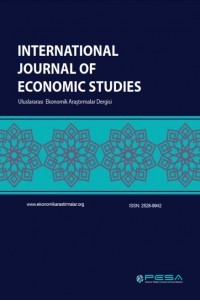Foreign Direct Investments and Economic Freedom in OECD Countries
Foreign Direct Investments and Economic Freedom in OECD Countries
___
- Azman-Saini, W.N.W., Baharumshah, A.Z. and Law, S.H. (2010). Foreign Direct Investment, Economic Freedom and Economic Growth: International Evidence, Economic Modelling, Vol. 27, pp. 1079-1089.
- Baum, C.F. (2009). Instrumental variables and panel data methods in economics and finance, Retrieved from: http://fmwww.bc.edu/GStat/docs/StataIV.pdf.
- Dag, M., Kizilkaya, O., and Demez, S. (2018). Samaritan Çıkmazı Bağlamında Dış Yardımların Ekonomik Büyümeye Etkisinin İncelenmesi: Ampirik Bir Analiz, Maliye Araştırmaları Dergisi, Vol.4, No. 1, pp. 17-25.
- Dawson, J.W. (2003). Causality in the Freedom-Growth Relationship.European Journal of Political Economy, Vol. 19, pp. 479-495.
- Heckelman, J.C. (2000). Economic Freedom and Economic Growth: A Short-Run Causal Investigation, Journal of Applied Economics, pp. 71-91.
- Hossain, M.S. (2016). Foreign Direct Investment, Economic Freedom and Economic Growth: Evidence from Developing Countries. International Journal of Economics and Finance, Vol. 8, No. 11, pp. 200-214.
- Kapuria-Foreman, V. (2007). Economic Freedom and Foreign Direct Investment in Developing Countries.The Journal of Developing Areas, Vol. 41, No. 1, pp. 143-154.
- Lopez, L. and Weber, S. (2017). Testing for Granger Causality in Panel Data. Online article, source: https://www.unine.ch/files/live/sites/irene/files/shared/documents/Publications/W orking%20papers/2017/WP17-03_V2.pdf.
- Moussa, M., Caha, H., and Karagoz, M. (2016). Review of Economic Freedom Impact on FDI: New Evidence from Fragile and Conflict Countries. Procedia Economics and Finance, Vol. 38, pp. 163-173.
- Muslija, A., Satrovic, E. and Unver Erbas, C, (2017). Panel Analysis of Tourism -Economic Growth Nexus, International Journal of Economic Studies, Vol. 3(4), pp. 535-545.
- Ozcan, C.C., Aslan, M. and Nazlioglu, S. (2017). Economic Freedom, Economic Growth and International Tourism for Post-Communist (Transition) Countries: A Panel Causality Analysis. Theoretical and Applied Economics, Vol. XXIV, pp. 75-98.
- Rajapakse, C.R. (2016). The Relationship between Foreign Direct Investment and Tourism Development: Evidence from Sri Lanka. International Journal of Research in Economics and Social Sciences, Vol. 6(5), pp. 183-193.
- Sambharya, R. and Rasheed, A. (2015). Does Economic Freedom in Host Countries Lead to Increase Foreign Direct Investment? Competitiveness Review, Vol. 25 (1), pp. 2-24.
- Satrovic, E. and Sehic, E. (2015). Composite Index for Quality of Life in Municipalities in Federation of Bosnia and Herzegovina, CEEOL (Central and Eastern European Online Library) EBSCO, ISBN 978-9926-410-07-0, Vol. CLXIV, No. 6, pp. 275-289.
- Satrovic, E. (2017). Financial Development and Human Capital in Turkey: ARDL Approach, Cappadocia Academic Review, Vol. 1, No. 2, pp. 1-15.
- Satrovic, E. (2018a). Merits of Life Insurance, Munich: GRIN Verlag.
- Satrovic, E. (2018b). The Human Development Relies on Renewable Energy: Evidence from Turkey, 3rd International Energy & Engineering, Book of Proceedings, Gaziantep, Turkey, pp. 19-27.
- Satrovic, E. and Muslija, A. (2017). Foreign Direct Investments and Tourism: Empirical Evidence from Turkey, ICPESS Proceedings, Vol. 2, pp. 88-100.
- Satrovic, E. and Muslija, A. (2018). Causality Relationship between Foreign Direct Investment and Tourism. International Journal of Economics and Administrative Studies, Vol. 22, pp. 65-76.
- Somun-Kapetanovic, R., Resic, E. and Satrovic, E. (2016). Panel Analysis of Relationship between Financial Development and Economic Growth, 8th International Conference of School of Economics and Business Sarajevo, Conference Proceedings, ISSN 2490- 3620, pp. 247-262.
- Sothan, S. (2017). Causality between Foreign Direct Investment and Economic Growth for Cambodia. Cogent Economics & Finance, Vol. 5, pp. 1-13.
- The World Bank (2017). World Development Indicators.
- Yazdi, S.K., Nateghian, N. and Rezaie, N.S. (2017). The Causality Relationships between Tourism Development and Foreign Direct Investment: An Empirical Study in EU Countries. Journal of Policy Research in Tourism, Leisure and Events, Vol. 9, pp. 1- 18.
- ISSN: 2528-9942
- Başlangıç: 2015
- Yayıncı: Politik Ekonomik ve Sosyal Araştırmalar Merkezi
Arap Baharı Olaylarının Orta Doğu Ekonomilerine Etkileri
Tüketimin Ekonomik Temelleri ve Türkiye’deki Bileşenleri
Foreign Direct Investments and Economic Freedom in OECD Countries
Mine IŞIK, Özlem ÖZTÜRK ÇETENAK
Türkiye’de Günah Vergileri Kapsamında Özel Tüketim Vergisi Uygulaması ve Etkinliği
